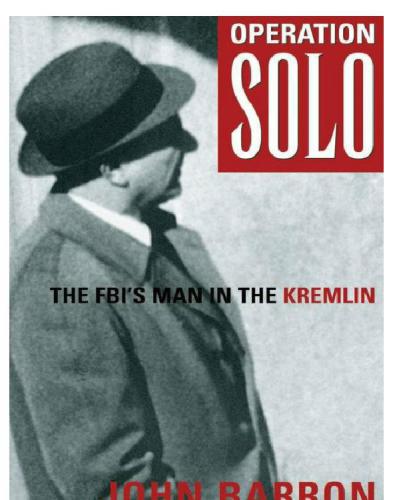
Operation Solo
The FBI's Man in the Kremlin
کتاب های مرتبط
- اطلاعات
- نقد و بررسی
- دیدگاه کاربران
نقد و بررسی

January 1, 1996
Although Morris Childs (1902-1991) was treated as a friend by Soviet rulers Khrushchev, Brezhnev and Andropov, this Chicago communist and onetime editor of the Daily Worker, the U.S. Communist Party newspaper, was an American spy working for the FBI. Barron (FBI Today) interviewed his wife, Eva Lieb Childs, and numerous FBI operatives to produce this remarkable true-life espionage story, which often reads like a spy thriller. According to Barron, Operation Solo (as the Childses' group was called) yielded intelligence that enabled Washington to exploit the Soviet Union's widening rift with China in the 1960s; their spying also helped Nixon and Kissinger forge ahead with diplomatic ties to Beijing. Born Moishe Chilovsky, near Kiev (he emigrated to America when he was nine), Childs also befriended Castro, Mao Tse-tung, East Germany's Walter Ulbricht and other Communist leaders. In 1987, Reagan awarded him a presidential medal. Photos.

April 15, 1996
Traditionally, it is the Central Intelligence Agency that carries out foreign espionage for the United States, but attention to the American Communist Party gave the FBI an opportunity to infiltrate communism's highest international levels. It is amazing that the FBI apparently managed to keep it a secret all these years. Morris Childs (1902-91) trained in Moscow as a Comintern agent and became a labor agitator in the Midwest during the Depression. He became the editor of the Communist Daily Worker in 1946 but fell out of favor with the American party next year. Suffering a heart attack, he became disillusioned at what communism had become and thus was willling, along with his brother, to cooperate with the FBI when approached in the mid-1950s. Childs was rehabilitated to become the American party's foreign minister and the main funnel for funds from abroad. He advised the Soviets on America and reported to Washington what the Communists were thinking. Childs received the Order of Lenin from the grateful Russians, and Leonid Brezhnev even hosted a banquet for his 75th birthday. It is interesting to read about the role of Childs in some of the great international events of the time. Perhaps most disturbing is the account of the aged and isolated Soviet leadership hysterically seeking signs that the entire world was going to attack in the mid-1980s. Barron (The KGB Today, Reader's Digest, 1983) was able to interview Childs and other principals in the case. Suitable for public and academic libraries.-Daniel K. Blewett, Loyola Univ. Lib., Chicago

February 15, 1996
Coming in from the cold, FBI agents reveal through Barron the story of their agent who hobnobbed with Politburo members for 20 years. He was Morris Childs, a prominent American Communist Party leader in the 1930s who had inwardly rejected the cause and then volunteered his services to the FBI. Delighted, the feds watched Childs return to the party fold in the mid-1950s as the number two leader whose portfolio was inter-party affairs, consisting of two priorities: aligning the American party with the Soviet one in the Sino-Soviet split and funneling the Soviet money that sustained the American party. A classic double agent with access to the adversary's intentions and fears, Childs listened to his Soviet "comrades" complain about the insidious dogmatists in Beijing, their power struggles among themselves, and their warped opinions of America--supersecret dope he transmitted straight to U.S. presidents. Barron concludes his salute to an unheralded spy with the late Childs' brushes with exposure in the mid-'70s during investigations into the FBI. Interesting disclosures for enthusiastic espionage readers. ((Reviewed Feb. 15, 1996))(Reprinted with permission of Booklist, copyright 1996, American Library Association.)

























دیدگاه کاربران